Masters Snooker: Information and a Potted History
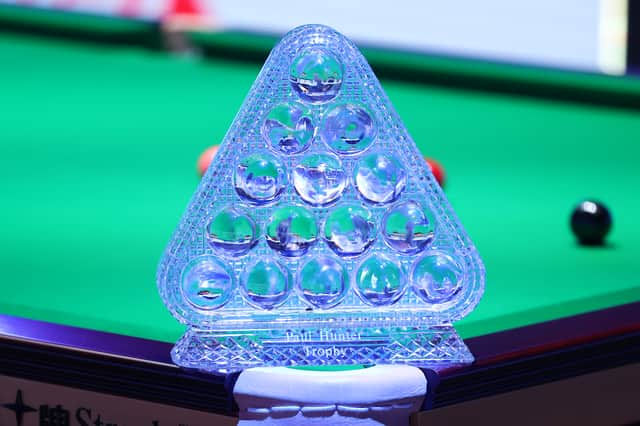

Featuring the top players from the world rankings, The Masters is part of the celebrated Triple Crown Series of events alongside the UK Championship and the World Championship. Despite not being ranked, many fans and players rate the competition as the second most important title in the sport on par with the UK due to its stature, appeal and history.
In recent times, the Masters has strictly become an event only for those inside the world’s top 16 rankings (although sometimes due to non-entries/withdrawals, this isn’t always the case).
Advertisement
Advertisement
The event initially fielded 10 players before expanding to 12 and then 16. There was a period from 1990 when there was an additional round for wildcards featuring the winner of a satellite qualifying event and invited players selected by the sponsors.
There have been 50 editions of the Masters, with 25 different champions and 11 multiple-time winners.
Since the 2017 staging, contestants have played for The Paul Hunter Trophy, a fitting honour to the three-time Masters champion.
A very special tournament with elite talents, a one-table set-up in a big arena and countless epic endings, the Masters really is a fans’ favourite.
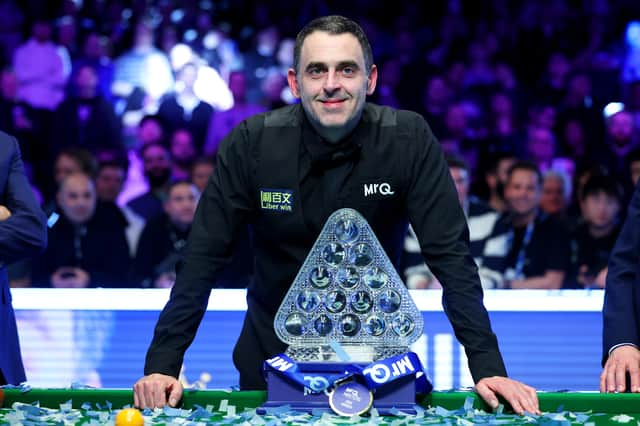

Masters Snooker: Most successful players, stats, stories, best finals
Advertisement
Advertisement
Ronnie O’Sullivan is the most decorated player in Masters history with a record eight title victories. From his 29 appearances in the event, he has reached the final on 14 occasions.
O’Sullivan is both the youngest (1995, as a 19-year-old) and oldest (2024, as a 48-year-old) Masters champion – an incredible feat that highlights his durability at the very top of the sport.
The Rocket won his maiden crown in 1995 when he defeated John Higgins 9-3 in an all-teenage final. Despite three further final outings after that, O'Sullivan had to wait a decade for his second Masters crown, again, seeing off Higgins in the showpiece encounter.
That victory began a spell of three title triumphs in five years, with trophy lifts following final wins against Ding Junhui (2007) and Mark Selby (2009).
Advertisement
Advertisement
O'Sullivan has won the Masters at three different venues, including four times at its current home of the Alexandra Palace. Three of those titles arrived in four years (2014, 2016, 2017) with the latter victory meaning he retained the title for the first time and joined an elite club alongside Cliff Thorburn, Stephen Hendry and Paul Hunter, who had all also successfully defended.
Glory in 2017 also saw O’Sullivan overtake Hendry’s six-title benchmark to become the most successful Masters exponent, a record he swelled to eight in 2024.
At the 2015 installment in front of appreciative crowds, O’Sullivan equalled and later passed Hendry’s professional centuries record tally of 775.
Hendry, though, still holds several remarkable Masters records which look to stand for a very long time.
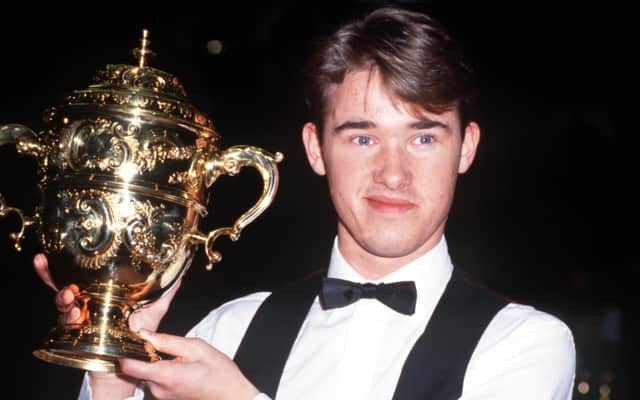

Advertisement
Advertisement
The great Scot won on his Masters debut in 1989 and went on a staggering unbeaten record at the Wembley Conference Centre, claiming five consecutive titles (1989-1993), a streak so extraordinary that he was allowed to keep the gold trophy following his fifth win.
Hendry’s run stretched to 23 matches before he was ousted by fellow countryman Alan McManus 9-8 in the 1994 final. This was McManus’ first top tier professional trophy.
No player in Masters history has won more than two consecutive titles, except for Hendry who notched up five, once again underlining his dominance in the 1990s.
Mark Selby - who also won on his debut, in 2008 - reached three finals in his first three attempts, pipping O'Sullivan in a memorable duel in 2010 for title number two, before recording a hat-trick in 2013.
Advertisement
Advertisement
Alex Higgins was the first player to win the Masters more than once (1978, 1981) and Thorburn was the first to successfully defend the title (1985, 1986).
The Masters is synonymous with Paul Hunter, who lit up the tournament with a plethora of iconic salvos, and whose name the trophy is titled in honour of following his tragic passing due to cancer in 2006 at the age of just 27.
Hunter won three Masters titles in the space of only four years (2001, 2002, 2004), where on each occasion he conjured up a remarkable recovery in the final.
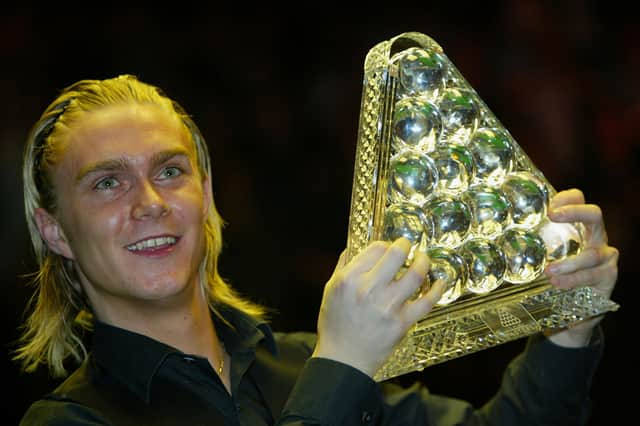

The ‘Beckham of the Baize’ came back from 7-3 and 8-5 down against Fergal O'Brien in 2001, 5-0 down against Mark Williams in 2002, and 7-2 down against O'Sullivan in 2004. Every time, Hunter rallied and eventually recorded dramatic deciding frame victories.
Advertisement
Advertisement
The Masters has witnessed 11 deciding frame finishes, three of which went down to the very last ball. This includes the inaugural staging in 1975 at the West Centre Hotel in London where John Spencer sank the re-spotted black to oust Ray Reardon, 9-8.
Reardon, who was triumphant a year later, also lost on the final pink to Doug Mountjoy in an all-Welsh decider in 1977.
In 1998, Mark Williams came back from three down with four to play to deny Hendry a record-extending seventh Masters title; the players were only separated by a re-spotted black in the decider, just like 23 years earlier.
Eight years later, John Higgins produced the greatest counter-attack under pressure you’re ever likely to see when he stopped O’Sullivan recording a third consecutive Masters final victory against him.
Advertisement
Advertisement
Arriving to the table 60 points down in the deciding frame, Higgins crafted a trademark 64 clearance to win on the final black – a fitting finale for the last visit to the Wembley Conference Centre.
Dennis Taylor came back from 8-5 down to defeat Alex Higgins 9-8 in the 1987 final, while Selby responded from 9-6 behind to deny O’Sullivan 10-9 in the 2010 title match, however, the greatest final turnaround in the Masters annals came in 1991.
Defending champion Hendry dropped just two frames in three matches getting to the final but found himself 7-0 (first session whitewash) and 8-2 adrift to a rampant Mike Hallett, who was making his second Masters final appearance having been whitewashed 9-0 by Steve Davis in 1988.
Hendry, though, strung together an unforgettable seven-frame streak, nabbing several close frames including the decider that he took on the final pink to complete a hat-trick and keep his undefeated record going.
Advertisement
Advertisement
Players representing eight different nationalities have won the Masters. The first non-UK champion was South Africa’s Perrie Mans who did not make a single half-century break en route to the trophy in 1979.
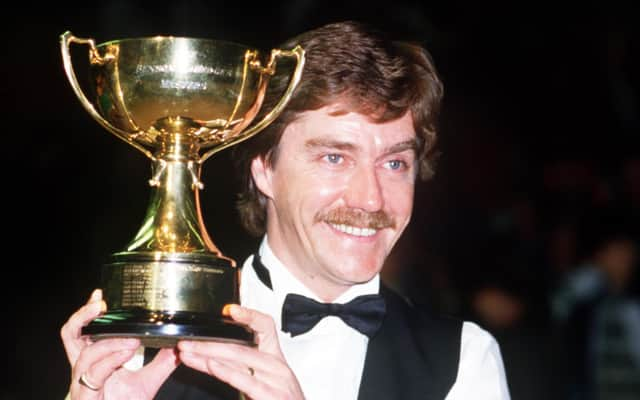

Since then, overseas talents Thorburn (Canada), Ding Junhui (China), Neil Robertson (Australia) and Yan Bingtao (China) have also added their names to the illustrious roll of honour. Robertson’s maiden Masters win in 2012 was the first year the event was held at its current home of the Alexandra Palace. Yan’s triumph in 2021 was behind closed doors due to the Covid-19 Pandemic; held in Milton Keynes, it is the only time the Masters has not been played in London.
Ding introduced himself on the world stage when he won his debut match as a 16-year-old wildcard in 2004 – the youngest player ever to appear in the competition.
Masters Snooker: Roll of Honour, Locations and Winner's Prize Money
1975: John Spencer 9-8 Ray Reardon (West Centre Hotel, London) | £2,000
Advertisement
Advertisement
1976: Ray Reardon 7-3 Graham Miles (New London Theatre, London) | £2,000
1977: Doug Mountjoy 7-6 Ray Reardon (New London Theatre, London) | £2,000
1978: Alex Higgins 7-5 Cliff Thorburn (New London Theatre, London) | £3,000
1979: Perrie Mans 8-4 Alex Higgins (Wembley Conference Centre, London) | £3,000
Advertisement
Advertisement
1980: Terry Griffiths 9-5 Alex Higgins (Wembley Conference Centre, London) | £4,500
1981: Alex Higgins 9-6 Terry Griffiths (Wembley Conference Centre, London) | £6,000
1982: Steve Davis 9-5 Terry Griffiths (Wembley Conference Centre, London) | £8,000
1983: Cliff Thorburn 9-7 Ray Reardon (Wembley Conference Centre, London) | £16,000
Advertisement
Advertisement
1984: Jimmy White 9-5 Terry Griffiths (Wembley Conference Centre, London) | £35,000
1985: Cliff Thorburn 9-6 Doug Mountjoy (Wembley Conference Centre, London) | £37,500
1986: Cliff Thorburn 9-5 Jimmy White (Wembley Conference Centre, London) | £45,000
1987: Dennis Taylor 9-8 Alex Higgins (Wembley Conference Centre, London) | £51,000
Advertisement
Advertisement
1988: Steve Davis 9-0 Mike Hallett (Wembley Conference Centre, London) | £56,000
1989: Stephen Hendry 9-6 John Parrott (Wembley Conference Centre, London) | £62,000
1990: Stephen Hendry 9-4 John Parrott (Wembley Conference Centre, London) | £70,000
1991: Stephen Hendry 9-8 Mike Hallett (Wembley Conference Centre, London) | £100,000
Advertisement
Advertisement
1992: Stephen Hendry 9-4 John Parrott (Wembley Conference Centre, London) | £105,000
1993: Stephen Hendry 9-5 James Wattana (Wembley Conference Centre, London) | £110,000
1994: Alan McManus 9-8 Stephen Hendry (Wembley Conference Centre, London) | £115,000
1995: Ronnie O'Sullivan 9-3 John Higgins (Wembley Conference Centre, London) | £120,000
Advertisement
Advertisement
1996: Stephen Hendry 10-5 Ronnie O'Sullivan (Wembley Conference Centre, London) | £125,000
1997: Steve Davis 10-8 Ronnie O'Sullivan (Wembley Conference Centre, London) | £135,000
1998: Mark Williams 10-9 Stephen Hendry (Wembley Conference Centre, London) | £145,000
1999: John Higgins 10-8 Ken Doherty (Wembley Conference Centre, London) | £155,000
Advertisement
Advertisement
2000: Matthew Stevens 10-8 Ken Doherty (Wembley Conference Centre, London) | £165,000
2001: Paul Hunter 10-9 Fergal O'Brien (Wembley Conference Centre, London) | £175,000
2002: Paul Hunter 10-9 Mark Williams (Wembley Conference Centre, London) | £190,000
2003: Mark Williams 10-4 Stephen Hendry (Wembley Conference Centre, London) | £210,000
Advertisement
Advertisement
2004: Paul Hunter 10-9 Ronnie O'Sullivan (Wembley Conference Centre, London) | £100,000
2005: Ronnie O'Sullivan 10-3 John Higgins (Wembley Conference Centre, London) | £125,000
2006: John Higgins 10-9 Ronnie O'Sullivan (Wembley Conference Centre, London) | £125,000
2007: Ronnie O'Sullivan 10-3 Ding Junhui (Wembley Arena, London) | £130,000
Advertisement
Advertisement
2008: Mark Selby 10-3 Stephen Lee (Wembley Arena, London) | £150,000
2009: Ronnie O'Sullivan 10-8 Mark Selby (Wembley Arena, London) | £150,000
2010: Mark Selby 10-9 Ronnie O'Sullivan (Wembley Arena, London) | £150,000
2011: Ding Junhui 10-4 Marco Fu (Wembley Arena, London) | £150,000
Advertisement
Advertisement
2012: Neil Robertson 10-6 Shaun Murphy (Alexandra Palace, London) | £150,000
2013: Mark Selby 10-6 Neil Robertson (Alexandra Palace, London) | £175,000
2014: Ronnie O'Sullivan 10-4 Mark Selby (Alexandra Palace, London) | £200,000
2015: Shaun Murphy 10-2 Neil Robertson (Alexandra Palace, London) | £200,000
Advertisement
Advertisement
2016: Ronnie O'Sullivan 10-1 Barry Hawkins (Alexandra Palace, London) | £200,000
2017: Ronnie O'Sullivan 10-7 Joe Perry (Alexandra Palace, London) | £200,000
2018: Mark Allen 10-7 Kyren Wilson (Alexandra Palace, London) | £200,000
2019: Judd Trump 10-4 Ronnie O'Sullivan (Alexandra Palace, London) | £200.000
Advertisement
Advertisement
2020: Stuart Bingham 10-8 Ali Carter (Alexandra Palace, London) | £250,000
2021: Yan Bingtao 10-8 John Higgins (Marshall Arena, Milton Keynes) | £250,000
2022: Neil Robertson 10-4 Barry Hawkins (Alexandra Palace, London) | £250,000
2023: Judd Trump 10-8 Mark Williams (Alexandra Palace, London) | £250,000
Advertisement
Advertisement
2024: Ronnie O'Sullivan 10-7 Ali Carter (Alexandra Palace, London) | £250,000
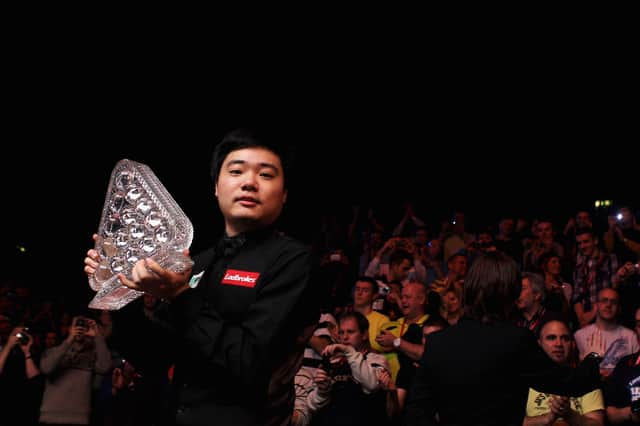

Masters Snooker 147 Breaks
1984: Kirk Stevens (Semi-Finals)
2007: Ding Junhui (Wildcard Round)
2015: Marco Fu (Round One)
2024: Ding Junhui (Round One), Mark Allen (Quarter-Finals)
Five maximum 147 breaks have been made in Masters snooker history. Ding Junhui is the only player to have compiled more than one.
2024 is the only year where more than one 147 was constructed.
The contributions Kirk Stevens and Ding crafted in 1984 and 2007 respectively were their first 147s in professional competition.
Advertisement
Advertisement
In the 2000 final, Ken Doherty missed the final black for a 147. It would have been his first maximum in a professional event, and the first in a Triple Crown final.
It also cost him an £80,000 sports car, although he did pick up the £19,000 high break bonus for the 140, along with the £85,000 runners-up prize.